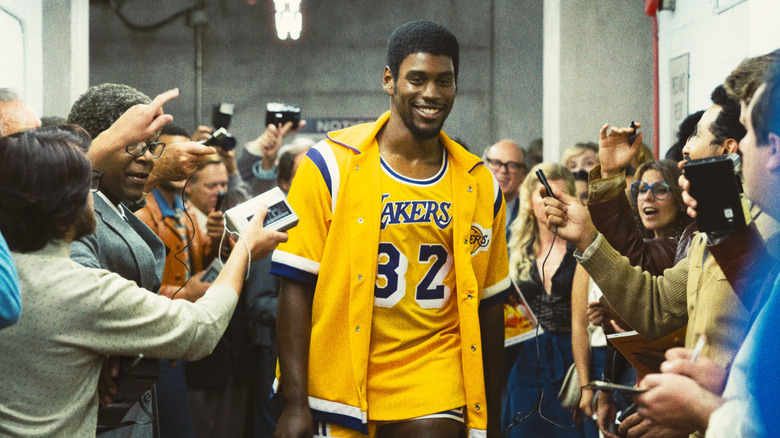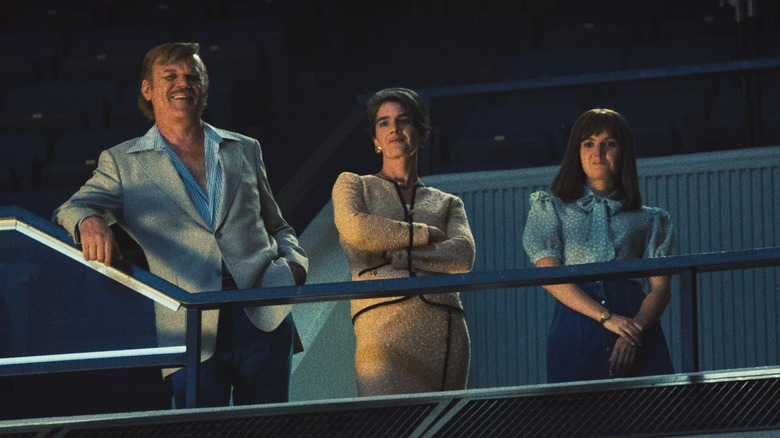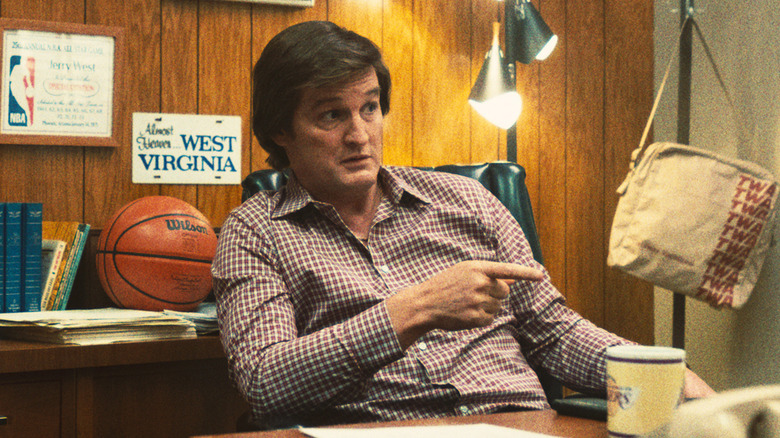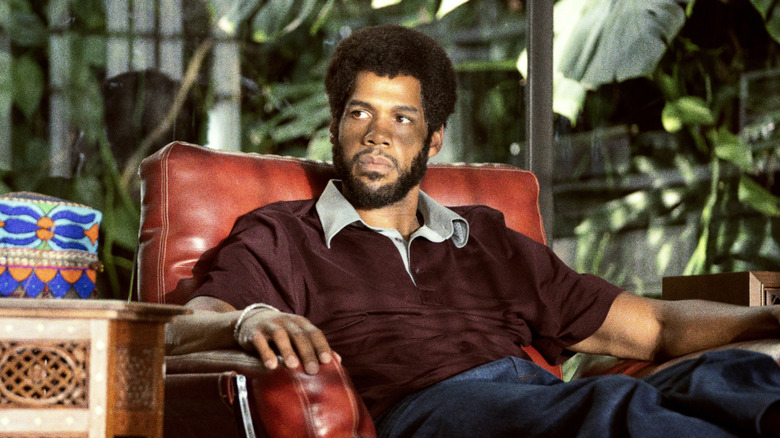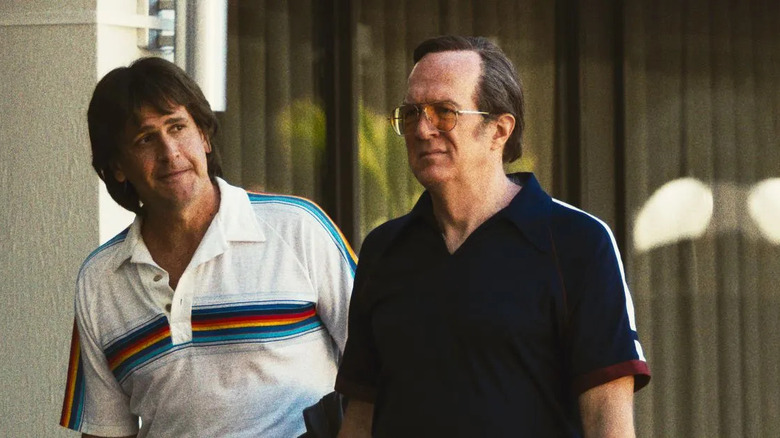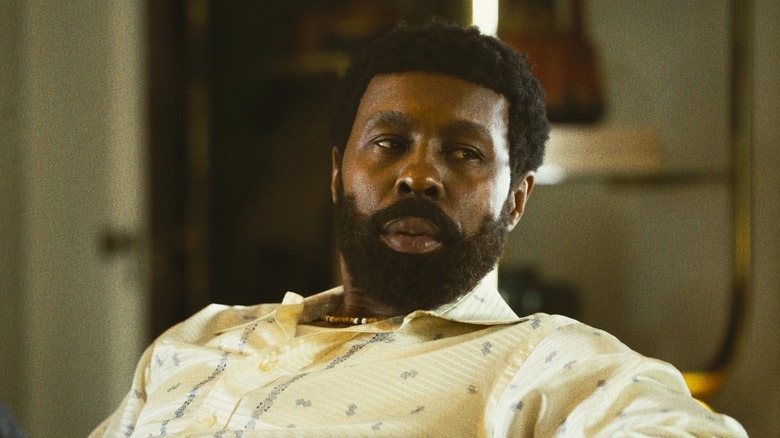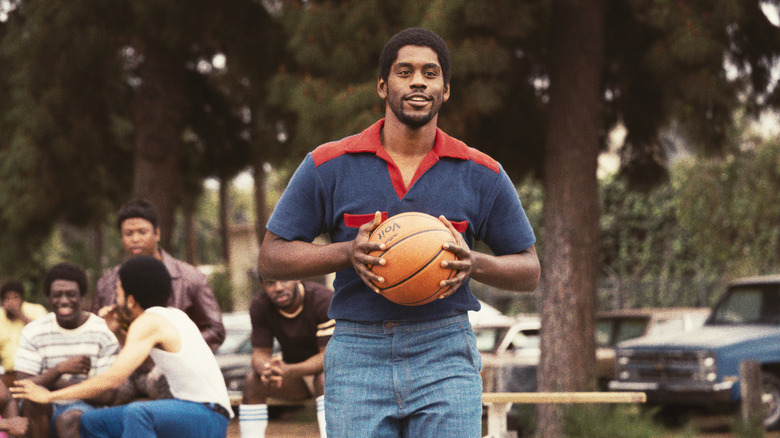How Much Of Winning Time Is A True Story?
In its own stylish and amplified way, "Winning Time: The Rise of the Lakers Dynasty" tells the story of the Magic Johnson-led Laker era from the '80s. Hailing from producer Adam McKay, who is no stranger to elevating real-life stories in his previous projects "The Big Short" and "Vice," the HBO series embellishes the high-stakes journey of the Lakers basketball team at its lowest with the help of Jerry Buss (John C. Reilly) and newly-drafted Johnson (Quincy Isaiah). Based on the best-selling non-fiction book "Showtime: Magic, Kareem, Riley, and the Los Angeles Lakers Dynasty of the 1980s," the Emmy-nominated show gives insight into the personal trials and tribulations the basketball stars and the team's front office go through to achieve championship-level success.
"Winning Time" does not present itself as a documentary-like recounting of what occurred during the "Showtime" era. In essence, most of the story is true — the Lakers dynasty did indeed win all of those trophies — but some small details have been elevated or straight-up fictionalized to provide dramatic effect and fill out the ten-episode narrative. Almost every character is exaggerated according to their personal traits, and while it makes for engrossing television, some of their real-life counterparts have spoken against the interpretations. However, "Winning Time" does pull from reality for the show's most shocking moments (that crazy Spencer Haywood subplot, for example). Separating fact from fiction is tough due to the nature of the beast, but there are key elements that can be broken down with the information publicly available.
A new kind of front office
The big bang of the "Showtime" Lakers dynasty is the arrival of new owner Jerry Buss, a wealthy man who made his fortune in real estate and looked to basketball for his latest venture. Like in the show, the Los Angeles-based team was declining in popularity — in fact, the NBA as a whole required a boost in cultural relevance, and the 1979 draft provided just that. After drafting Magic Johnson, Buss wanted to position the 6'9" point guard as a centerpiece of the team, revitalizing a rivalry with the Celtics and Larry Bird. He then commissioned the Lakers Girls dance team, spearheaded by Paula Abdul (Carina Conti II). A true story best represented by his fictional quote: "There are two things in this world that make me believe in God: sex and basketball."
A figure that rises from the old regime to lead a new era of the Lakers is Claire Rothman (Gaby Hoffmann), a key part of the resounding success "Winning Time" outlines after Buss purchases the financially-struggling team. Rothman put Jerry's mantra to work and increased ticket sales to the Forum, accurately presented in the HBO adaptation. However, when it comes to Jeanie Buss (Hadley Robinson), the show moves up the timeline of her involvement in the sports organization. Unlike in "Winning Time," the real Jeanie already had a degree and years of experience in the sports field before officially joining the Lakers.
Another key part of the new and improved Los Angeles Lakers is the inclusion of experienced players on and off the court. Despite accurately showing their involvement with the team, the real faces behind the personas take issue with how "Winning Time" depicts them.
Was Jerry West really that angry all of the time?
In regards to the portrayal of Jerry West (Jason Clarke), his comically rageful personality is not exactly representative of his true character, at least according to West himself. Clarke is downright magnetic as the former Lakers head coach, but there is no indication that his hilarious outbursts on the show occurred in real life. "The series made us all look like cartoon characters. They belittled something good. If I have to, I will take this all the way to the Supreme Court," West told the Los Angeles Times in reaction to the HBO adaptation. Although I can understand his sentiment, I'm not sure anyone really thinks Clark's performance is anything other than an extreme exaggeration used to produce some of the show's funniest moments.
In addition to his performance, there are some inaccuracies when it comes to his trajectory with the Lakers. For instance, West did not quit on the team as the head coach right before the season but instead did it months beforehand. And when he did, West did not actually destroy his Finals MVP trophy in a fit of rage. In fact, Abdul-Jabbar has gone public in his support of West, declaring that he "never broke golf clubs, he didn't throw his trophy through the window." Abdul-Jabbar's criticism of the series does not stop there, as he has something to say about his own characterization in the series.
Was Kareem really like that?
By the start of "Winning Time," Kareem Abdul-Jabbar (Solomon Hughes) is a veteran in the NBA league and the lone superstar on the declining Lakers team. Hughes plays Abdul-Jabbar as an uber-serious man who is not enthusiastic about playing anymore and the character often contemplates whether or not basketball is the most important thing to him. Through his faith, he eventually gains a new perspective on his career and some of Magic Johnson's optimism rubs off on him, leading the team into the NBA finals. Hughes more than just captures Abdul-Jababr's awe-dropping stature, providing depth to what initially seems a one-note version of the basketball star — especially in the latter half of the season.
To no one's shock, the real Abdul-Jabbar is not the biggest fan of the series interpretation of his decade-defining run as a Laker. On top of stating the show is "drearily dull," Abdul-Jabbar writes that he is not bothered by the general portrayal of his personality, no matter how wrong it may be, but makes it clear he would never tell a kid to "f*** off" as he does while filming "Airplane!" on the HBO series. In fact, he even thinks small moments like that hurt the chances of a kid joining his Skyhook Foundation. What his article dismisses, however, is the attempt by McKay and crew to create emotional weight to the character's journey by means of his faith and desire for social justice.
As Abdul-Jabbar states in his piece, the show does not have to be historically accurate to tell the essence of the team's journey. And I'd argue that, in the long run, "Winning Time" pays homage to the important sports figures represented in the series — especially when it comes to a former head coach.
Yes, that happened to Jack McKinney
Out of the many things "Winning Time" changes to increase the drama, the storyline surrounding the head coach(es) sticks pretty closely to the facts. When the sports organization's preferred candidate Jerry Tarkanian bows out after his close friend is killed by the mob (yes, that really happened), Jack McKinney (Tracy Letts) joins the Lakers and forever changes how the NBA plays on the offensive end of the court. However, his stint on the Los Angeles-based team is relatively short-lived as he is hospitalized for a good portion of the regular season after a freak bike accident. The unfortunate situation forces his assistant Paul Westhead (Jason Segel) to coach the team all the way into the finals.
Not only is all of this true, but McKinney did in fact depart the team after his partial recovery, leaving Westhead to coach another season before being fired and replaced by Pat Riley (Adrien Brody). Unfortunately, McKinney never fully recovered from the accident as his memory issues continued far after his time with the Lakers. He later won the Coach of the Year award under the Indiana Pacers, but eventually had to retire due to health problems stemming from the accident. He is still considered a major factor in the birth of the "Showtime" era, having directly contributed to the bombastic playstyle that launched a full-fledged dynasty.
Having said that, the animosity between McKinney and Westhead is exaggerated. There is no public evidence that there was an intense confrontation between them as it happens on "Winning Time." Although reporting from that same year indicated that their friendship suffered from the situation, there is no mention of McKinney having tormented Westhead for inadvertently taking his job. However, Westhead did have some near-deadly beef with a certain player.
Did Spencer Haywood really order a hit on the Lakers?
One of the most intense storylines in "Winning Time" is Spencer Haywood's heartbreaking relapse into drug addiction. The then-veteran basketball player, portrayed by Wood Harris, is revered by the team's captain (Abdul-Jabbar), but his long-term participation on the team is never guaranteed by interim head coach Paul Westhead. After breaking his promise to stay clean for the NBA finals, the team votes to cut him (Abdul-Jabbar being the deciding factor). By the end of episode 9, Haywood grows frustrated with his expulsion, and in a drug-induced moment of weakness, he tells a mysteriously unidentified man to kill the Lakers team.
While Haywood did not actually order a hit on the entire Lakers team (nor did he obtain a gun to do it himself), there was indeed a brief plan to end Paul Westhead's life by the use of a mobster. Years after the events of the series, Haywood admitted to ordering a hit on his coach: "In the heat of anger and the daze of coke, I phoned an old friend of mine, a genuine certified gangster . . . We sat down and figured it out." But, thankfully, Haywood did not go through with it because his own mother threatened to turn him to the police.
Excluding Haywood's personal vendetta against Westhead is a strange decision, especially since it could have still had the same shocking impact. That said, "Winning Time" is still able to capture the inspiring nature of "Showtime" and its relevance in sports history despite a few departures from the facts along the way.
Did Magic really get Cookie's friend pregnant?
A turning point in Magic Johnson's rocky relationship with Cookie (Tamera Tomakili) is the reveal that he slept with her friend Rhonda Mitchell (Chelsea M. Davis) and got her pregnant. She is only one of the many women he sleeps with throughout the first season but Rhonda's pregnancy causes a significant rift between Cookie and Johnson. However, Rhonda does not actually exist and, as far as we know, Johnson did not get any of Cookie's friends knocked up in real life. Rhonda may be an amalgamation of the women Johnson slept with during his basketball career; a representation of his attitude when it comes to dating. But her last name does point toward a real-life girlfriend of Johnson who he had a child with.
In the early '80s, Johnson and Cookie split temporarily, and during that time he dated Melissa Mitchell with whom he had his first child, Andre Johnson. The romantic relationship was short-lived, but it could have influenced some of Rhonda's characterization in "Winning Time." The on-again, off-again state of Johnson and Cookie's relationship is one of the central themes of the series, and introducing Rhonda (albeit fictional) emphasizes how difficult it was to maintain it.
Although Johnson has his own documentary detailing the true story behind his journey as a Laker, "Winning Time" creates its own room to move freely within history to tell a cohesive, eventful story that sticks the landing despite a few hiccups along the way.
